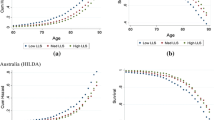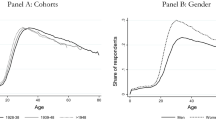Abstract
Using data from a 2007 survey in Northern Ireland (representative sample, N = 1036), we replicate and extend the US-based findings of Lacey et al. (Journal of Happiness Studies 7:167–182, 2006). Consistent with Lacey et al., we find that young people mispredict happiness levels in old age, believing—wrongly—that happiness declines with age. We explore the possible implications of this under-estimation of happiness in old age for the risky health behaviours of young people. We find that young male binge drinkers are particularly prone to thinking that happiness declines with age.
Similar content being viewed by others
Notes
With quota controlled samples there is often a slight variation between the set quotas and the quotas actually achieved. This slight variation is addressed by using a ‘weighting’ variable in the analysis to ensure that the sample analysed is exactly representative of the wider population on the range of important demographics (age, sex, social class and location).
We are grateful to one of the anonymous referees for advice on this issue.
References
Blanchflower, D. G., & Oswald, A. J. (2008). Is well-being u-shaped over the life span? Social Science and Medicine, 66, 1733–1749.
Carstensen, L. L., Pasupathi, M., Mayr, U., & Nesselroade, J. R. (2000). Emotional experience in everyday life across the adult life span. Journal of Personality and Social Psychology, 79, 644–645.
Charles, S. T., Reynolds, C. A., & Gatz, M. (2001). Age-related differences and changes in positive and negative affect over 23 years. Journal of Personality and Social Psychology, 80, 131–151.
Costa, P. T., Zonderman, A. B., McCrae, R. R., Cornoni-Huntley, J., Locke, B. Z., & Barbano, H. E. (1987). Longtitudinal analyses of psychological well-being in a national sample: stability of means test. Journal of Gerontology, 42, 50–55.
Guise, J. M., & Gill, J. S. (2007). ‘Binge drinking? It’s good, it’s harmless fun’: a discourse analysis of accounts of female drinking in Scotland. Health Education Research, 22, 895–8906.
Jukkala, T., Mäkinen, I. H., Kislitsyna, O., Ferlander, S., & Vågerö, D. (2008). Economic strain, social relations, gender and binge drinking in Moscow. Social Science and Medicine, 66, 663–674.
Kuntsche, S., Gmel, G., Knibbe, R. A., Kuendig, H., Bloomfield, K., Kramer, S., et al. (2006). Gender and cultural differences in the association between family roles, social stratification, and alcohol use: A European cross-cultural analysis. Alcohol and Alcoholism, 41, 37–46.
Kuntsche, E., Rehm, J., & Gmel, G. (2004). Characteristics of binge drinkers in Europe. Social Science and Medicine, 59, 113–127.
Lacey, H. P., Smith, D. M., & Ubel, P. (2006). Hope I die before I get old: mispredicting happiness across the adult lifespan. Journal of Happiness Studies, 7, 167–182.
Lohan, M. (2007). How might we understand men’s health better? Integrating explanations from critical studies on men and inequalities in health. Social Science and Medicine, 65, 493–504.
Moore, L., Smith, C., & Catford, J. (1994). Binge drinking: prevalence, patterns and policy. Health Education Research, 9, 497–505.
Moynihan, C. (1998). Theories in health care and research: theories of masculinity. British Medical Journal, 317, 1072–1075.
O’Brien, R., Hunt, K., & Hart, G. (2005). ‘It’s caveman stuff, but that is to a certain extent how guys still operate’: Men’s accounts of masculinity and help-seeking. Social Science and Medicine, 61, 503–516.
Rahave, G., Wilsnack, R., Blomfield, K., Gmel, G., & Kuntsche, S. (2006). The influence of societal level factors on men’s and women’s alcohol consumption and alcohol problems. Alcohol and Alcoholism, 41, 47–55.
Steptoe, A., Wardle, J., Cui, W., Bellisle, F., Zotti, A. M., Baranyai, R., et al. (2002). Trends in smoking, diet, physical exercise, and attitudes toward health in European university students from 13 countries, 1990–2000. Preventive Medicine, 35, 97–104.
Acknowledgments
This research was funded by Atlantic Philanthropies via the Changing Ageing Partnership (CAP) at Queen's University Belfast.
Author information
Authors and Affiliations
Corresponding author
Rights and permissions
About this article
Cite this article
Garry, J., Lohan, M. Mispredicting Happiness Across the Adult Lifespan: Implications for the Risky Health Behaviour of Young People. J Happiness Stud 12, 41–49 (2011). https://doi.org/10.1007/s10902-009-9174-1
Published:
Issue Date:
DOI: https://doi.org/10.1007/s10902-009-9174-1




